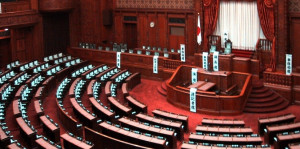
It was what was “at stake” in the previous electoral game that lent such importance to formally standard procedure for the re-election of half of the 242-seat upper house of the Japanese parliament (which is conducted every three years).
Stormy debates during the short 18-day election campaign were focused mainly around various aspects of (as yet relatively unproductive) economic policy maintained by Prime Minister Shinzo Abe, known as “Abenomics”.
The opposition parties vehemently criticised Abe for his formal violation of procedure for the cancellation of the deadline for the second stage of the sales tax increase program from the current 8% to 10% adopted in 2014.
However, in fact, the key issue that the incumbent Liberal Democratic Party (LDP) and, above all, its leader, S. Abe, were addressing during the elections concerned the possibility of starting the procedure of amending the post-war Constitution. Mainly, Article 9: the anti-war article.
To do this, two-thirds votes in the both houses of the parliament are required. However, up until the recent elections, the LDP (jointly with its “junior partner” – Komeito) only had a constitutional majority in the lower house.
But now, according to the preliminary results of the election, the LDP alongside Komeito and some new partners look set to gain the opportunity with a count of 165 mandates in total across the parties in the upper house.
Furthermore, the LDP increased its number of representatives in the house from 115 to 121. Komeito will have 25 mandates (up from 15). Of the new partners of the LDP, the stand-out example is the success of the party, Initiatives from Osaka, lead by Toru Hashimoto – the former mayor of the second largest city in Japan. It gained 12 seats (up from 7).
The Democratic Party, a major party of the opposition (for the time being), that recently (in 2009-2012) held a leading position in the Japanese political life suffered another fiasco. The DP will have only 49 seats instead of its previous 63.
These days, it is hard to believe that the leaders of this motley conglomerate of political trends (established 10-15 years ago as an alternative to the LDP whose popularity was waning) will ever manage to reverse these negative trends.
In terms of what the average man on the streets considers the most significant, the economic growth prospects of the DP merely look like a facsimile of opposition to the LDP. For the accusations made against the latter of the “illegal” postponement of the deadline for the second stage of the sales tax increase are mainly of a procedural nature. As the DP itself agreed with the LDP regarding the statement of the need for such a step back in the summer of 2012.
The results of the recently held elections has confirmed the trend towards the gradual return of the Communist Party to the Japanese political arena. It was the leading force of the opposition in the 1950-60s but fell out of the race in the subsequent 50 years (for good, it had seemed).
In the mid-term elections to the upper house of the parliament in 2013, the Communist Party won 11 seats (for the first time in many years). According to the results of this election, it will already have 14 deputy mandates.
It was the victory of a communist candidate (representing the younger generation of the Communist Party) in Tokyo that became the important symbol of this rather remarkable process that is occurring in Japanese politics.
As always, it is difficult to determine what the average person is guided by when they make some kind of mark on the ballot paper. It is as if the majority of LDP supporters had no idea that they were involved in answering one of the key questions that concerns not only the future of Japan but also the entire political situation in the Asia-Pacific Region (and perhaps in the whole world).
An express survey of 150 voters conducted by correspondents of the Mainicho Shimbun newspaper showed that over 60% of voters did not even grasp the importance of their votes in terms of the prospective amendments to the current Constitution. Only 13% of LDP supporters voted for this Party based primarily on their considerations of the need for such amendments. It was economic considerations that prevailed among other the reasons for supporting the LDP (33%).
In this regard, the LDP’s election tactics can be considered successful. In the public debates, its representatives (primarily S. Abe) did not place emphasis on the (still unpopular) subject of amending the Constitution at all, focusing on various aspects of “Abenomics”.
However, we would like to emphasize again, the opportunity to initiate the procedure for amending the Constitution (especially Article 9) was the central objective of the LDP and its leader S. Abe. Immediately after the announcement of the preliminary election results, he declared his intention to “start a discussion” of the matter at an extraordinary session of the parliament in the forthcoming autumn this year.
China reacted to the results of the Japanese election in an expected manner (“as a threat to Japan itself, and regional stability“).
In this regard, we can certainly philosophise on the unprecedented nature of Article 9 in the world practice, which deprives Japan of the right not only to use force to defend national interests, but also to have armed forces. Why should modern-day Japan drop out of the “norm” in our abnormal (and increasingly mad) world?
However, from a practical standpoint, another thing is important. The foreign political ramifications of the elections to the upper house of the Japanese parliament are already clear and, unfortunately, fit into the general trend of the deterioration of the situation in the Asia-Pacific Region.
Vladimir Terekhov, expert on the issues of the Asia-Pacific region, exclusively for the online magazine “New Eastern Outlook”
